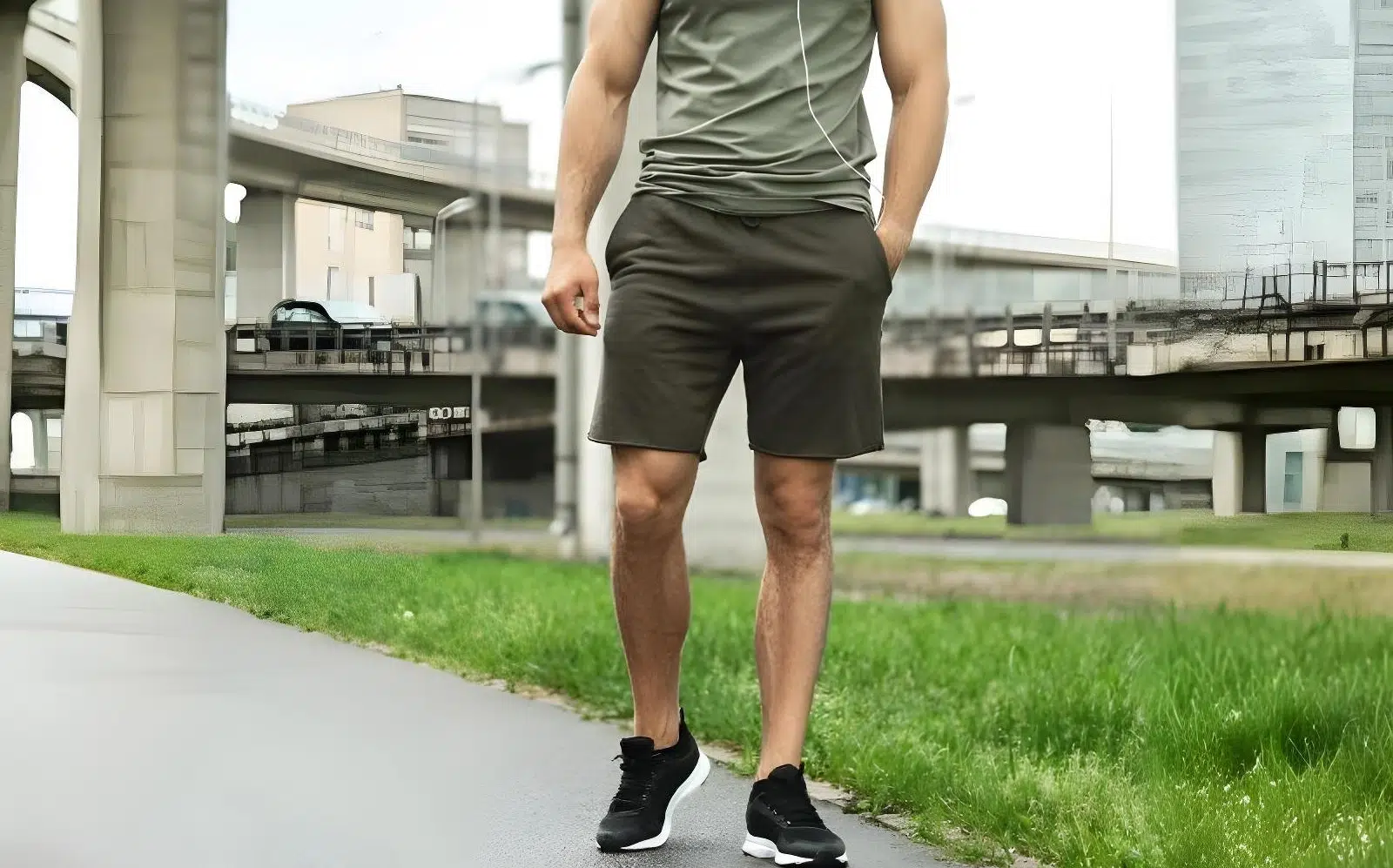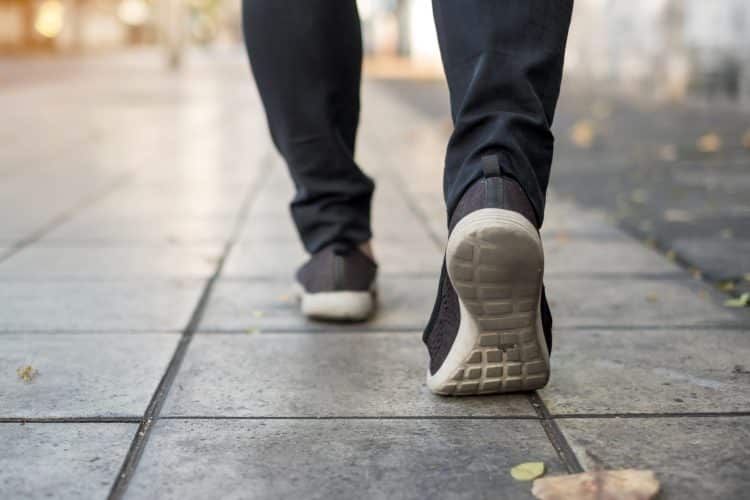Ask any expert to name the most important exercise for long-term fitness and health, and they’ll probably say squats. A few may say deadlifts, and bodybuilders will probably say biceps curls!
However, the real GOAT of fitness and health activities is walking.
Walking offers many benefits – too many to list here – but reasons to include more walking in your workout schedule include (1):
- Easy weight management
- Better posture
- Reduced stress
- Lower blood pressure
- Improved blood lipid profile
- More stable blood glucose
- Improved muscular endurance
- Increased bone density
- Better sleep
- Increased creativity and improved problem-solving
- Better memory
And yet, despite this, many people fail to reach the 10,000 steps recommended by most health authorities. That’s a shame given how transformative walking can be for your health, fitness, and appearance.
Related: What Happened When I Walked 10,000 Steps Every Day for a Year
I’m a veteran personal trainer and have been helping people get fit, lose weight, and optimize their health for more than 30 years. While my job includes writing and guiding my clients through bespoke workouts, I also advise most of them to walk between 8,000 and 10,000 steps per day.
This, I half-jokingly tell them, is their homework.
This is a big shock for many, so I get them to start slow and easy – usually by asking them to go for a 20-minute walk at the end of each day.
Of course, I’d never ask my clients to do anything I haven’t done myself so, in this article, I share my experience of taking a 20-minute walk at the end of each day for two weeks.
Adding a 20-Minute Walk to My Pre-Bed Routine
I’ve always been an avid walker, and average around 15,000 steps per day. This is one of the reasons I’m able to stay very lean without trying too hard, and that my health and fitness are well above average for my age.
I do most of my walking before breakfast when I take my dogs out for their morning exercise. My remaining steps are just part and parcel of an active lifestyle. I also hike at weekends, which further contributes to my weekly step count.
Related: How to Walk for Fitness and Fat Loss – Your Ultimate Guide
All that said, I tend to be quite sedentary in the late afternoon and evening. In fact, once I’ve had my last meal of the day, I usually spend a couple of hours relaxing in front of the TV.
Consequently, adding a 20-minute walk to the end of my day took quite a lot of effort as it involved breaking away from the powerful gravitational pull of my couch, lacing up my sneakers, and going for a walk when I’d normally be heading up to bed.
Still, that was the challenge, so that’s what I had to do!
The Effects and Benefits of a 20-Minute Nighttime Walk
As I already walk well above 10,000 steps per day, I didn’t think adding a 20-minute evening walk to my schedule to have much of an effect. However, the results were quite an eye-opener and reinforced my opinion that walking is one of the most powerful things you can do for your fitness and health.
The effects and benefits of finishing my day with a 20-minute walk were as follows:
Improved Digestion
Many cultures used to recommend going for a short walk after dinner to aid digestion. Italians called this practice passegiata, while Germans called it verdauungsspaziergang, and it’s called shatapawali in Ayurvedic medicine.
Like many traditional practices, going for a post-meal walk is less common in modern times, and most people (me included) tend to be quite sedentary after eating.
It turns out that walking after eating can do wonders for your digestion, and I experienced significantly less nighttime indigestion and bloating after going for a stroll between my evening meal and bedtime.
This effect is not unique to me, and a PubMed meta-analysis supports the digestive-enhancing benefits of walking after meals (2). Plus, as a bonus, studies also suggest that walking after eating enhances protein metabolism which, in theory, promotes better recovery from workouts and enhanced muscle growth (3).
While I didn’t experience any additional muscle or strength gains during my two-week post-dinner walking experiment, I definitely appreciated the lack of digestive discomfort that sometimes bothers me.
Summary: A short nighttime walk aids digestion and helps prevent bloating and indigestion.
Less Anxiety and Stress

Stress and anxiety are common problems that many people face – me included. While these are mental disorders, they can have a massive impact on your physical health and are linked to a host of medical issues, including:
- Elevated blood pressure
- Type II diabetes
- Cardiovascular disease
- Increased cancer risk
- Sexual dysfunction
- Hair and skin conditions
- Digestive problems
The good news is that studies suggest that light exercise is an excellent treatment for stress and anxiety (4).
Without realizing it, I discovered that some of the shows I watch before going to bed are responsible for triggering anxiety and stress. The news is especially stress-inducing, and some very exciting TV shows also left me feeling wound up.
However, that all stopped when I began going for a short walk before bed. As I walked, I could literally feel the weight of the day lifting off my shoulders so that, when I returned home 20 minutes later, I was relaxed and in a much more positive frame of mind.
Needless to say, anything that enhances your mental health is worth pursuing, even if it means turning off the TV a little earlier so you can go out for a 20-minute walk.
Summary: Going for a nighttime walk can do wonders for your mental health by reducing stress and anxiety.
Improved Sleep Quality and Duration
Sleep is the unsung hero of health and fitness. Getting enough sleep is vital for your mental and physical well-being and can be the difference between reaching or failing to achieve your fitness goals.
Related: The Importance of Sleep for Building Muscle and Losing Fat
Most experts agree that adults need 7-9 hours of sleep per night. This invariably means going to bed at a sensible time. However, even if you get enough sleep, you may still wake up feeling unrested.
Why? Poor sleep quality is the answer.
A good night’s rest requires plenty of deep sleep with minimal periods of restlessness and few incidences of wakefulness. Unfortunately, a lot of people toss and turn all night and spend very little time sleeping deeply.
My smartwatch has a sleep monitoring function and provides me with a sleep score each morning. Invariably, my score is somewhat low because I’m usually a light, restless sleeper.
That all changed when I started taking a short walk before going to bed.
Whether it was the reduction in anxiety and stress, or the dark exposure resetting my circadian (sleep/wake) rhythm, my sleep score improved during my two-week pre-bed walk experiment. I was less restless, had fewer periods of wakefulness, and slept more soundly.
As a result, I woke up feeling energized and ready to face the day instead of desperately reaching for my first cup of coffee!
My experience is supported by research published on PubMed which demonstrates there is a strong link between light pre-bed exercise and better sleep quality and duration (5).
Studies aside, I know that I feel much better after a good night’s sleep, and really appreciated this unexpected benefit of going for a stroll before going to bed.
Summary: A short walk before going to bed can lead to a better night’s sleep and improved energy the following day.
How to Get the Most from Finishing Your Day With a 20-Minute Stroll
Going for a 20-minute walk before bed requires a certain amount of effort. Follow these guidelines so that you receive the greatest rewards and benefits:
Stroll, Don’t Sweat!
Do not turn your evening stroll into a workout! Your pace should be very relaxed, and you should arrive home feeling like you could have done a lot more. If you are hot or out of breath, your walk hurts rather than helps you get a good night’s sleep.
Consider Your Route
Avoid taxing your brain more than necessary by following a familiar route. You’ll find it much harder to relax if you are worried about getting lost. Plan your route in advance and follow it each time you go for your evening stroll.
Avoid areas you know to be unsafe and if possible, pass by green spaces e.g., parks and gardens, which are proven stress reducers (6).
Avoid Bad Weather
While you should be as consistent as possible with your walks, it’s okay to skip a night if the weather is bad. Going for a walk in heavy rain or severe cold will probably add to your stress levels and wake you up, undoing any potential benefits of taking a nighttime stroll.
Dress Appropriately
Wear loose, comfortable clothing and shoes for your evening walk. Your stress levels will rise if your feet hurt or your clothes restrict your movements. Also, make sure you’re warm enough as being cold will wake you up, which is the opposite of what you want to happen.
Make it a Habit
The benefits of going for a pre-bedtime are cumulative and you’ll need to do it several times before seeing results. So, commit to going for a 20-minute walk every night for at least two weeks. Monitor your progress to determine if this is an effective intervention for you.
Closing Thoughts
As a regular walker, I wasn’t expecting much from two weeks of evening strolls. I figured it was something that I’d quit as soon as my two-week experiment was over. However, I was honestly shocked at how rewarding this simple habit was.
In fact, I plan on continuing to go for a 20-minute stroll before bed for the foreseeable future.
If you have trouble sleeping, experience nighttime digestive issues, or want to reduce stress and anxiety, an evening walk could be the solution you’ve been waiting for.
So, turn off the TV a little earlier, pull on your shoes, and head for a relaxing walk. You won’t regret it!
References:
1 – Bai X, Soh KG, Omar Dev RD, Talib O, Xiao W, Cai H. Effect of Brisk Walking on Health-Related Physical Fitness Balance and Life Satisfaction Among the Elderly: A Systematic Review. Front Public Health. 2022 Jan 31;9:829367. doi: 10.3389/fpubh.2021.829367. PMID: 35174137; PMCID: PMC8841590.
2 – Engeroff T, Groneberg DA, Wilke J. After Dinner Rest a While, After Supper Walk a Mile? A Systematic Review with Meta-analysis on the Acute Postprandial Glycemic Response to Exercise Before and After Meal Ingestion in Healthy Subjects and Patients with Impaired Glucose Tolerance. Sports Med. 2023 Apr;53(4):849-869. doi: 10.1007/s40279-022-01808-7. Epub 2023 Jan 30. PMID: 36715875; PMCID: PMC10036272.
3 – Cruthirds CL, Deutz NEP, Ligthart-Melis GC, Simbo SY, Engelen MPKJ. Walking exercise alters protein digestion, amino acid absorption, and whole-body protein kinetics in older adults with and without COPD. J Appl Physiol (1985). 2021 Feb 1;130(2):435-444. doi: 10.1152/japplphysiol.00783.2020. Epub 2020 Nov 19. PMID: 33211598; PMCID: PMC8828265.
4 – Bahri AA, Korairi HA, Gosadi IM, Othathi FA, Shami MO, Jareebi MA. The relationship between walking and depression, anxiety, and stress among a sample from Jazan, Saudi Arabia: A cross-sectional investigation. Medicine (Baltimore). 2022 Sep 23;101(38):e30718. doi: 10.1097/MD.0000000000030718. PMID: 36197205; PMCID: PMC9509039.
5 – Sullivan Bisson AN, Robinson SA, Lachman ME. Walk to a better night of sleep: testing the relationship between physical activity and sleep. Sleep Health. 2019 Oct;5(5):487-494. doi: 10.1016/j.sleh.2019.06.003. Epub 2019 Jul 26. PMID: 31358470; PMCID: PMC6801055.
6 – Ma J, Williams JM, Morris PG, Chan SWY. Effectiveness of a mindful nature walking intervention on sleep quality and mood in university students during Covid-19: A randomized control study. Explore (NY). 2023 May-Jun;19(3):405-416. doi: 10.1016/j.explore.2022.08.004. Epub 2022 Aug 11. PMID: 35973933; PMCID: PMC9365743.
Tip: If you're signed in to Google, tap Follow.













